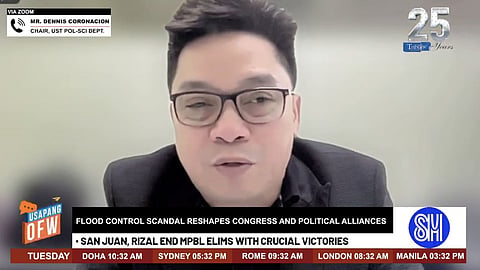
- NEWS
- the EDIT
- COMMENTARY
- BUSINESS
- LIFE
- SHOW
- ACTION
- GLOBAL GOALS
- SNAPS
- DYARYO TIRADA
- MORE

As Filipinos marked the 53rd anniversary of the declaration of Martial Law on 21 September, this year’s commemoration carried a sharper edge as it coincided with mass protests over the alleged trillion-peso corruption scandal in government.
Professor Dennis Coronacion, chair of the Department of Political Science at the University of Santo Tomas, said the protests drew a striking parallel between the plunder and abuses of the Marcos dictatorship and the present controversy hounding the administration.
“September 21 represents a dark chapter in our history. It refers to the proclamation of Martial Law by the late dictator Ferdinand Marcos Sr., during which human rights violations and large-scale corruption took place. We’re talking about billions of dollars,” Coronacion told the DAILY TRIBUNE in Filipino.
He added that the sentiments expressed by demonstrators this year highlight how corruption continues to fuel public outrage.
“There was corruption during the time of the late dictator Ferdinand Marcos Sr., and there is also corruption now. In terms of magnitude and amount, they are not far apart – we are still talking about huge sums of money,” he said.
The political analyst noted that while most protest venues remained peaceful, violence erupted in parts of the University Belt, particularly near Recto Avenue and Ayala Bridge, where rioters clashed with authorities.
“That disturbance is what made the September 21 protest stand out,” Coronacion observed.
Speculation has since emerged on who was behind the unrest. “Many people are now asking: was this orchestrated by the supporters of former President Duterte? Others believe it was a way for those in the lower economic classes to protest corruption in government,” Coronacion explained.
He warned that the anger over so-called ghost flood-control projects in the national budget could again erupt violently.
“The desire for change and for government to respond to corruption is very much alive in the hearts of Filipinos. Such feelings could again explode into another violent expression of frustration and disappointment,” he said.
Coronacion also underscored a widening gap between public expectations and the administration’s response.
“The administration wants to gauge the extent of the impact of this critical public sentiment. But if you ask the public, they want full accountability – whoever the evidence leads to, even if it reaches the President himself,” he said.
At the same time, he noted that senators and congressmen have been engaged in finger-pointing over the controversy.
“If it were up to the public, everyone involved – if there is enough evidence – should resign. And of course, resignation should not be the end of it. They must be charged, tried in court, and if the evidence is strong enough, they should be imprisoned,” Coronacion stressed.
